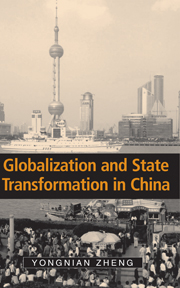Book contents
- Frontmatter
- Contents
- List of figures
- List of tables
- List of abbreviations
- Preface
- 1 Globalization: State decline or state rebuilding?
- 2 The state, leadership and globalization
- 3 Globalism, nationalism and selective importation
- 4 Power, interests, and the justification of capitalism: Constructing an interest-based political order
- 5 Bureaucratic reform and market accommodation
- 6 Building a modern economic state: Taxation, finance and enterprise system
- 7 State rebuilding, popular protest and collective action
- 8 Contending visions of the Chinese state: New Liberalism vs. the New Left
- 9 Globalization and towards a rule-based state governance?
- Notes
- Bibliography
- Index
- CAMBRIDGE ASIA-PACIFIC STUDIES
2 - The state, leadership and globalization
Published online by Cambridge University Press: 11 December 2009
- Frontmatter
- Contents
- List of figures
- List of tables
- List of abbreviations
- Preface
- 1 Globalization: State decline or state rebuilding?
- 2 The state, leadership and globalization
- 3 Globalism, nationalism and selective importation
- 4 Power, interests, and the justification of capitalism: Constructing an interest-based political order
- 5 Bureaucratic reform and market accommodation
- 6 Building a modern economic state: Taxation, finance and enterprise system
- 7 State rebuilding, popular protest and collective action
- 8 Contending visions of the Chinese state: New Liberalism vs. the New Left
- 9 Globalization and towards a rule-based state governance?
- Notes
- Bibliography
- Index
- CAMBRIDGE ASIA-PACIFIC STUDIES
Summary
Most scholars have propounded the rather pessimistic view that globalization weakens the power of nation-states, with some even predicting their demise. Nevertheless, if we look at how the Chinese state has responded to globalization, a different conclusion may arise. Whether globalization weakens or strengthens the power of the state depends on how the state responds to it.
This chapter first presents the scholarly context of the connections between the state and globalization. The state here is treated as an independent variable. I attempt to show that the state per se has been a part of globalization, and a major driving force behind the process. For developing countries like China, globalization means not only capitalist development; more importantly, it means the spread of the modern state from the West to the rest of the world. After the review of the scholarly context, this chapter then sets up a theoretical framework for this study.
The scholarly context: the state and globalization
Both neo-Marxists and neo-liberals have linked the decline of the power of the state to economic globalization, but their argument is not without criticisms. According to Michael Mann, they are vulnerable to criticism since they have downplayed political power relations. Mann points out, “With little sense of history, they exaggerate the former strength of nation-states; with little sense of global variety, they exaggerate their current decline; with little sense of their plurality, they downplay inter-national relations.
- Type
- Chapter
- Information
- Globalization and State Transformation in China , pp. 22 - 38Publisher: Cambridge University PressPrint publication year: 2003

